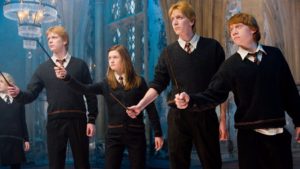“Harry Potter” and the Revolution: “If They Can Do It, Why Not Us?”
A common message across works of young adult fiction and fantasy is that young people have the power to change the world. Harry Potter is no different; young people were at the forefront of the resistance against Voldemort as members of the Order of the Phoenix, Dumbledore’s Army, and the fighting force that won the Battle of Hogwarts. This activism on the part of young people is widely praised when presented in fictional worlds, though it is often met with scorn and skepticism in the Muggle world. But those who doubt the ability of young leaders to transform their communities would do well to remember the words of Albus Dumbledore: “Age is foolish and forgetful when it underestimates youth.”

The world is full of problems that seem too complex to solve, and any envisioned solutions are often slapped down with the phrase “it’s not that simple.” Hermione Granger formed SPEW with a vision of freeing all house-elves and ensuring their fundamental rights. But the abuse of house-elves without consequence was so deeply rooted in society that most people scoffed at her efforts. Hermione learns that she cannot force her vision into being, that house-elves and humans alike must work to change not only the laws but also their mindsets. Still, Hermione’s idealistic vision of elf equality is at the center of her quest to dismantle this institution.

When Scrimgeour approaches Harry to ask for his support, Harry responds with blunt disapproval of the Ministry’s methods. Scrimgeour’s appeals to politics and citizen morale fall on deaf ears; where Scrimgeour sees a complex political balancing act, Harry sees a simple question of right and wrong. Harry’s refusal to cooperate is seen as naïve, but his words cut through the tangle of political considerations that Scrimgeour built around Voldemort’s ascent and return focus to the mission that Scrimgeour seems to have forgotten: to fight evil without sacrificing the good.
The ability to meet entrenched injustice with idealism is a strength that young people bring to the table, not a weakness. Why shouldn’t all house-elves be freed, given equal rights, and treated universally with respect and kindness? Why shouldn’t the Ministry of Magic release Stan Shunpike from Azkaban? Why shouldn’t we envision a world free of weapons, or a society free of racism and discrimination? Why shouldn’t we fight with the goal of eradicating, and not just alleviating, those ills that devastate our society? The hopeful vision that sustains such monumental aspirations is no mere childish fantasy, but has the power to fuel social movements that span generations.

The revolutions of the wizarding world are characterized by disruption of the status quo. Harry formed Dumbledore’s Army to disrupt the Ministry’s attempts to keep Hogwarts students from learning to defend themselves. Harry’s interview with the Quibbler stood out amidst the slew of false and misleading information churned out by the government and caused many former detractors to reconsider their beliefs about Voldemort’s return. Fred and George’s fireworks stunt and later abandonment of Hogwarts altogether called attention to just how awful things were under Umbridge’s regime. Ginny, Luna, and Neville stole the sword of Gryffindor, freed first years who had been chained up, and graffitied the castle walls to undermine the brutal Carrow regime.

Yet in the Muggle world, disruption is met with disparagement, with calls for activists to sit down and shut up, to be less unruly, or to know their place. Activists in my home state and across America hear these criticisms as they stand up, lie down, kneel, walk out, and demand action by being disruptive. The aim of social activism is not to cause unnecessary trouble, but to draw attention to injustice in order to begin to fix it. In the real world and in fantasy, disruption is a powerful tool that activists are already using to make their voices heard.
The transformative power of dedicated young people is not a concept confined to the realm of fantasy, nor does it solely belong to the leaders of revolutions. Harry and his friends were heroes long before Voldemort’s return, and even after his downfall, they continued to fight for a better world. Harry and Ron became Aurors, Hermione fought for justice through the Ministry, and Neville became a teacher. Stories like theirs are why so many young people, including myself, are inspired to become leaders in their communities. After all, “if they can do it, why not us?”

